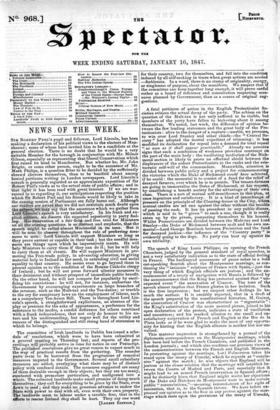The speech of King Louis Philippe; on opening the Oren&
Chambers, judged by the general standard of royal speeches, is not a very satisfactory indication as to the state of official feeling in France. The hackneyed assurances of peace usher in a bold out-speaking flourish about the Montpeneier marriage, as con- tinuing the " intimate " relations of-France with Spain,—just the very thing of which English officials are jealous ; and the an- nouncement of a treaty of navigation with Russia is followed by the announcement that the King has protested against that "un- expected event" the annexation of Cracow. The tone of the speech almost implies that France glories in her isolation. Such is the first impression ; but we suspect other feelings lie be- neath the surface. It is credibly reported, that in a draft of the speech prepared by the constitutional historian, M. Guizot, the annexation of Cracow was characterized as " regrettable' : the King's substitution of the more neutral phrase, joined to his open declaration of the protest, indicates a state of vacillation and uneasiness ; and his marked allusion to the small and un- satisfactory cooperation of French and English at the Rio de la Plata looks as if' he were glad to make the most of any opportu- nity for hinting that the English alliance is neither lost nor un- valued.
This maturer impression is strengthened by a perusal of the diplomatic correspondence on the Montpensier marriage, which has been laid before the French Chambers, and published in the London journals ; and which also confirms our previous views of the communications between the French and English Ministers. In protesting against the marriage, Lord Palmerston takes his stand upon the treaty of Utrecht, which he regards as " conclu-
sive " against the match ;. he also objects that England will be jealous at the closer relation that the marriage will establish be- tween the Courts of Madrid and Paris, and especially that it ,
might lead to an armed French intervention in Spanish affairs ; and he distinctly hints that England might waive her objections if the Duke and Dutchess de Montpensier were to make certain
public "renunciations,"—meaning renunciations of her right of succession, that is, to the Spanish throne. We have before ,ex- pressed our opinion as to the flaw in any protest against the mar- riage which rests upon the provisions of the treaty of Utrecht,
and as to the utter futility of any claim, under that treaty, for further renunciatiOns:
So much for the matter in issue. It is observed by a leading journal, the reverse of unfriendly to our present Adtninistration, that Lord Palmerston's bearing in the conduct of the dispute is unfavourably contrasted with the French Minister's. The contrast could not have escaped the most casual observation. Speaking generally, the state of the case on either side may be thus de- scribed : King Louis Philippe was pursuing his own interests, and M. Guizot is trying with all his might to make the best of the affair: England had no interests or none but what were very remote, and her Minister is trying with all his might to make the worst of the affair. He goes far beyond the necessi- ties of the case, far beyond diplomatic decorum, or even the de- cencies of controversy between gentlemen : he lays himself open -to just and temperate rebukes from M. Guizot, for making a ,coarsely-expressed and random charge against the French diplo- matists of using "moral coercion " upon Queen Isabella, for drag- :ging the French Sovereign into the dispute by name, and for -garbling the writing of his antagonist in the controversy by way of building up a charge of inconsistency ! Lord Palmerston seizes the occasion to make insinuations of shabby conduct. He .seems to forget that all parties to the controversy were presumed . to be gentlemen. His writing reads as if it were throughout animated by a malignant spirit seeking to give offence and to Tender the breach as wide as possible. We do not say that such was his deliberate intention ; but we cannot deny that, if his . -purpose was otherwise, his manner was lamentably calculated to ,belie him.
. It is fortunate that this correspondence has been -brought to light so soon. Its prompt publication fulfils M. Guizot's pro- mised appeal from the British Minister to the British public. -Among reflecting readers, that appeal will meet with a response not indeed favourable to the selfishness and finesse of the Court of the Tuileries, but gravely condemnatory of the imprudent, mischie- vous, petty spirit, of the present British Secretary for Foreign Affairs. It will virtually be an appeal even to some of Lord Pal- inerston's own colleagues, who cannot have been privy to the lum- bering despatches when they were transmitted. We believe, indeed, -that their worst effect may be neutralized by public opinion, and by subsequent communications conceived more in the spirit of that public opinion. For where two peoples, like the French and English, have mutual interests so close, and know that they have, it is impossible that they can be dragged into conflict by indiscre- tion so individual and so transparent.



























